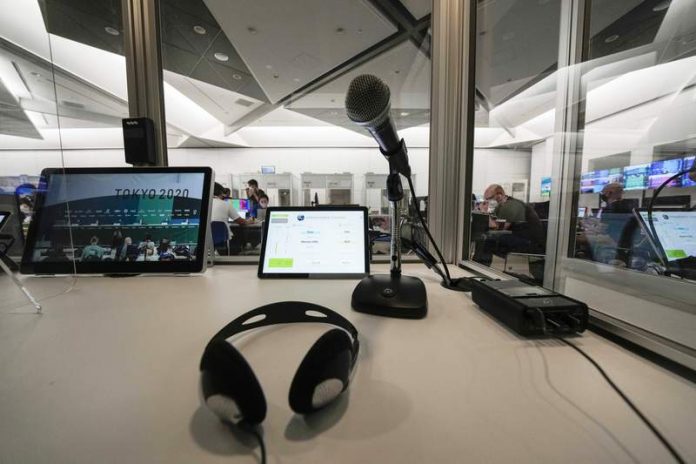TOKYO – Ask him how many languages he speaks and Alexandre Ponomarev replies: “If you want to make yourself understood, I stopped counting.”
Count them. Ponomarev speaks Russian, Ukrainian, English, German, Spanish, French and Danish. And gets by in Swedish, Portuguese, Italian and Norwegian.
Ahh, but how about your Japanese?
“Muzukashi,” replied Ponomarev, which means “difficult” in Japanese and can be interpreted as not speaking much.
Okay, nobody is perfect.
Ponomarev is the chief interpreter for the Tokyo Games and oversees a staff of nearly 100 interpreters who turn Olympic joy and heartache into a calibrated cacophony of 11 languages: Japanese, English, French, Spanish, German, Russian, Italian, Arabic, Chinese , Korean and Portuguese.
Ponomarev completed his first Olympic Games in Beijing in 2008 and took over the post of chief in Rio de Janeiro in 2016. His mother introduced him to language learning by smuggling DVDs of American films into the old Soviet Union. One by one the languages piled up.
advertisement
“When someone walks into a room full of interpreters and someone doesn’t speak the languages, it feels like being in the Tower of Babel,” he said, explaining languages and the use of strange words. It may seem crazy, but we really aren’t. ”
What they are in Tokyo is busy.
Most work in the main press center in a wired room with 20 translation booths on the walls. Wires, screens, and computer encoders splice their words into a network. The stalls are decorated with Japanese art by famous masters such as Hokusai and have labels such as JPN or ENG to identify the languages in which the work is carried out.
Unlike previous Olympic Games, all interpretation is done remotely. Press conferences from remote locations are fed into the press center hub. About two dozen interpreters are not even in the country and come from America or Europe to cope with the nightly events in Japan.
advertisement
Your simultaneous translations can be called up by app at all Olympic venues. As a result, interpreters are no longer caught in traffic on their way to a venue – and handheld translation devices no longer need to be distributed.
“We are here in the press center all the time and follow what is happening on television like everyone else,” says Andrea Hofmann Miller, a German interpreter. “In Rio we had to sit on the bus for about four hours just to get to the swimming area. And if in my case a German-speaking athlete didn’t win, we spent eight hours on the bus for free. “
Ponomarev pointed out that cultural differences affect language. He can assign a Brazilian Portuguese speaker to a Brazilian and a Portuguese speaker to a Portuguese speaker; also with Spanish, which is spoken differently in 20 countries.
A visitor who recently walked into his office found Ponomarev speaking Spanish with a Spanish accent. He was talking to an Argentine, a Venezuelan and another Spaniard. They all spoke their own Spanish, and a couple of times they slipped into French.
advertisement
“If you have four or five interpreters in the room and they all share at least two or three languages, they switch back and forth automatically,” explains Ponomarev. “The conversation starts in one language and then quickly changes to another, simply because another language is better suited to talking about a particular topic.”
For a polyglot, switching between multiple languages seems more natural than staying in one, much like a musician playing multiple instruments. He used the example of the German word “Schattenfreude”, which means joy in the misfortune of others.
“This type of word only exists in German and it would be difficult to express this concept in English. There are also concepts that only exist in Russia and we do not convey them very well in any other language, long descriptions, we switch to another language and people will understand immediately. “
advertisement
He said his interpreters all got on their feet before the Olympics and studied the nuances of judo or the whims of modern pentathlon. But they can be taken by surprise, especially at new events like surfing and skateboarding.
“These are young people and they have their own language,” he said. “When someone says, ‘The wave is bad, man’ – it means the waves were great.”
Ponomarev and many of his staff have participated in high-level political events such as the G20 or the World Economic Forum, which are far more difficult than the Olympic Games.
“You have a multitude of people – presidents, kings, politicians, interesting influencers, whatever,” he said.
But things can get incredibly tricky at the Olympics at times. Hofmann Miller almost burst into tears when he talked about the 2010 Winter Games in Vancouver, when Georgian luge driver Nodar Kumaritashvili died in a training run before the opening ceremony. He lost control of this sled and hit a steel bar next to the track.
advertisement
“I was selected to do the press interview and it was a very, very sad event that I will never forget,” she said. “It was very moving and it was really difficult for all of us to sit on stage, listen to questions from the press and hold back our emotions.”
In the end, interpretation is more art than science – a discipline that requires skill, but also a strong dose of humanity. Both Ponomarev and the German interpreter Hofmann Miller acknowledge that they cheer the athletes or sympathize with them in defeat.
“We’re all really looking forward to these athletes,” said Ponomarev. “Because when you’re interpreting, you’re stuck in someone else’s head. You don’t interpret words, you interpret meanings. And when you’re in someone’s head, you start to sympathize. ”
___
More AP Olympics: https://apnews.com/hub/2020-tokyo-olympics and https://twitter.com/AP_Sports
Copyright 2021 The Associated Press. All rights reserved. This material may not be published, broadcast, rewritten, or redistributed in any way without permission.

